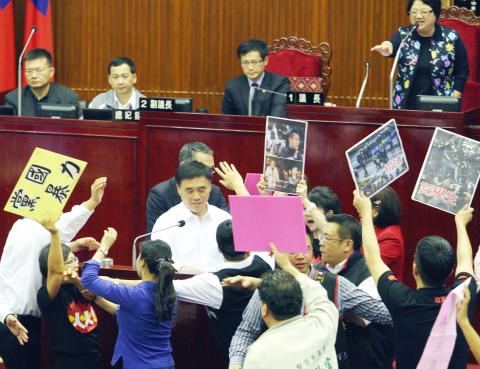Legislators are set to question the police chief and government officials today in a legislative committee over what has been described as one of the most bloody and violent crackdowns in recent memory when police evicted thousands of student protesters from the Executive Yuan in Taipei and injured dozens early on Monday morning.
Democratic Progressive Party (DPP) Legislator Chen Chi-mai (陳其邁), convener of the Legislative Yuan’s Internal Administration Committee, said yesterday that he had demanded that three senior government officials report on the police force’s order-keeping mission during the past week and its crackdown on the protesters, which began on Sunday.
The officials are Executive Yuan Secretary-General Lee Shu-chuan (李四川), Minister of the Interior Chen Wei-zen (陳威仁) and National Police Agency Director-General Wang Cho-chiun (王卓鈞).

Photo: CNA
The DPP called for the public to send in their photos and video clips recorded during the eviction of thousands of students and other protesters, who had broken off from the protest at the Legislative Yuan and took over the Executive Yuan compound on Sunday night.
DPP Deputy Secretary-General Lee Chun-yi (李俊毅) told a press conference that the public is unaware of what actually took place at the Executive Yuan compound in the latter part of the eviction because journalists had been removed from the compound by then.
Many students were beaten and seriously injured during that period as police were free from media scrutiny and could do whatever they wanted, Lee Chun-yi said.
A number of video clips showing police officers using excessive violence that were uploaded to YouTube have been removed from the site for unknown reasons, prompting suspicion that President Ma Ying-jeou’s (馬英九) administration had those videos “flagged” for violation of the site’s community guidelines.
The DPP has established a platform to collect evidence of the use of excessive force by police officers and is ready to take legal action against those who should be held accountable, DPP spokesperson Lin Chun-hsien (林俊憲) said.
Several riot police officers might be facing attempted murder charges, lawyer Huang Di-ying (黃帝穎) said.
Huang said Premier Jiang Yi-huah (江宜樺) and Wang should also be held accountable for ordering the crackdown, adding that while the evacuation of reporters before the crackdown was not illegal, it could have infringed on the freedom of the press.
The Taiwan Solidarity Union (TSU) also condemned what it said was excessive use of force in a news conference and said that the party is considering filing a lawsuit against the police over a serious injury sustained by TSU Legislator Chou Ni-an (周倪安) during the crackdown.
Chou was knocked down by riot police during the eviction, which left her unconscious, Huang said.
The lawmaker suffered a bone fracture under one of her eyes and remained hospitalized.
Meanwhile, a number of women’s rights groups, including the National Alliance of Taiwan Women’s Associations and the Awakening Foundation, yesterday condemned the Executive Yuan’s decision to order the eviction.

A Ministry of Foreign Affairs official yesterday said that a delegation that visited China for an APEC meeting did not receive any kind of treatment that downgraded Taiwan’s sovereignty. Department of International Organizations Director-General Jonathan Sun (孫儉元) said that he and a group of ministry officials visited Shenzhen, China, to attend the APEC Informal Senior Officials’ Meeting last month. The trip went “smoothly and safely” for all Taiwanese delegates, as the Chinese side arranged the trip in accordance with long-standing practices, Sun said at the ministry’s weekly briefing. The Taiwanese group did not encounter any political suppression, he said. Sun made the remarks when

The Taiwanese passport ranked 33rd in a global listing of passports by convenience this month, rising three places from last month’s ranking, but matching its position in January last year. The Henley Passport Index, an international ranking of passports by the number of designations its holder can travel to without a visa, showed that the Taiwan passport enables holders to travel to 139 countries and territories without a visa. Singapore’s passport was ranked the most powerful with visa-free access to 192 destinations out of 227, according to the index published on Tuesday by UK-based migration investment consultancy firm Henley and Partners. Japan’s and

BROAD AGREEMENT: The two are nearing a trade deal to reduce Taiwan’s tariff to 15% and a commitment for TSMC to build five more fabs, a ‘New York Times’ report said Taiwan and the US have reached a broad consensus on a trade deal, the Executive Yuan’s Office of Trade Negotiations said yesterday, after a report said that Washington is set to reduce Taiwan’s tariff rate to 15 percent. The New York Times on Monday reported that the two nations are nearing a trade deal to reduce Taiwan’s tariff rate to 15 percent and commit Taiwan Semiconductor Manufacturing Co (TSMC, 台積電) to building at least five more facilities in the US. “The agreement, which has been under negotiation for months, is being legally scrubbed and could be announced this month,” the paper said,

Japan and the Philippines yesterday signed a defense pact that would allow the tax-free provision of ammunition, fuel, food and other necessities when their forces stage joint training to boost deterrence against China’s growing aggression in the region and to bolster their preparation for natural disasters. Japan has faced increasing political, trade and security tensions with China, which was angered by Japanese Prime Minister Sanae Takaichi’s remark that a Chinese attack on Taiwan would be a survival-threatening situation for Japan, triggering a military response. Japan and the Philippines have also had separate territorial conflicts with Beijing in the East and South China